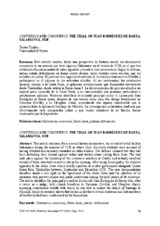Conversos and comuneros. The trial of Juan Rodríguez de Baeza, Salamanca, 1520
Autor
Tinsley, Teresa
Editor
Universidad de Córdoba, UcoPressFecha
2019Materia
ComunerosConversos
Santa Junta
Justicia
Difamación
Justice
Defamation
METS:
Mostrar el registro METSPREMIS:
Mostrar el registro PREMISMetadatos
Mostrar el registro completo del ítemResumen
Este artículo analiza, desde una perspectiva de historia social, los documentos emanantes de un proceso que tuvo lugar en Salamanca en el verano de 1520, en el que tres estudiantes fueron acusados de haber agredido y herido a otro universitario. Según la defensa, habían estado defendiendo su honor contra abusos, tanto verbales como escritos, que les tachaban de judíos. El proceso tuvo lugar en el contexto de la rebelión comunera en Castilla y participaron en él algunos de los activistas rebeldes. Al ser condenados, los estudiantes hicieron recurso a la Santa Junta, el gobierno revolucionario que funcionaba brevemente desde Tordesillas, donde estaba la Reina Juana I. La documentación del proceso alumbra un aspecto poco conocido de la Santa Junta, y su interconexión con personas particulares e instituciones públicas. Podemos identificar al acusado principal como el Licenciado Juan Rodríguez de Baeza quien, después de una carrera como juez, fue clérigo beneficiado en Carmona (Sevilla) y en Mengíbar (Jaén), acumulando una riqueza considerable que le permitió dotar la Iglesia de Santiago de Montilla. La investigación archivística confirma que efectivamente tuvo antepasados judíos y que varios miembros de su familia fueron condenados por la Inquisición. This article analyses, from a social history perspective, the record of a trial held in Salamanca during the summer of 1520 in which three university students were accused of having attacked and seriously wounded an older student. The defence claimed that they had been defending their honour against verbal and written abuse calling them Jews. The trial took place against the backdrop of the comunero rebellion in Castile and actually involved several of those who took an active role in the uprising. After being found guilty, the students appealed to the Santa Junta which briefly operated as a rebel government alongside Queen Juana from Tordesillas between September and December 1520. The case documentation therefore sheds a rare light on the operations of the Santa Junta and the interface of its members with private citizens and public institutions during the brief period of its existence. The article identifies the principal accused as Licenciado Juan Rodríguez de Baeza who, after a career as a judge, held church benefices in Carmona (Sevilla) and Menjíbar (Jaén), amassing considerable wealth with which he was able to endow the church of Santiago in Montilla. Archival research shows that he did in fact have Jewish forebears and that members of his family had been condemned by the Inquisition.

